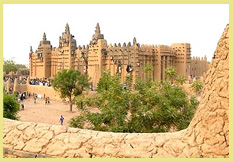




Mana Pools - Zimbabwe

Area: 6,766 km2
Inscribed: 1984
Criteria: (vii) aesthetic, (ix) ecological processes, (x) biodiversity
Values: This is an exceptional example of one of Africa's typical ecosystems - the miombo woodlands, which cover wide swathes of tropical southern Africa. It encompasses an area stretching from the top of the Zambezi escarpment to the valley floor, protecting the habitat (and seasonal migration routes) of vast herds of large mammals, (particularly elephants) which congregate along the Zambezi during the dry season, dispersing into the woodlands during the rains.
Slideshow of the Mana Pools National Park/world heritage site.
Impressions (based on a visit in September 2005): The concentration of large mammals along the banks of the Zambezi is one of Africa's great spectacles, and the experience is made all the more intimate and exciting at Mana Pools through walking and canoe safaris. Furthermore, the animals are reasonably well accustomed to humans, and close encounters are common. This is undoubtedly one of Africa's great game parks.
Management challenges: The commitment and resourcefulness of the management team at Mana Pools is exemplary, and - against all the odds - the site still retains most of the values for which it was inscribed on the world heritage list. How long this can be sustained is open to speculation, as the management challenges are immense. For example, the national park sector (covering a third of the total area of the world heritage site) has only one vehicle and virtually no operational funds. The park tracks are deteriorating and some are impassable during the rains. The most significant change since the world heritage site was listed has been the extermination of black rhinos to commercial poaching during the 80s and early 90s. Although not included in the list of world heritage In Danger, there can be little doubt that the integrity of the park is now threatened by the lack of resources for basic management, as well as the longer-term prospect of irrigated agriculture along the banks of the Zambezi, and the possibility of a hydroelectric dam at Mapata Gorge, which would flood many of the site's critical floodplain habitats. In the longer term, the ecology of the characteristic Faidherbia woodlands on the floodplains is bound to change, as many of the larger trees are killed by elephants, and regeneration is affected by the lack of seasonal flooding following construction of the Kariba Dam in 1958. Two thirds of the site (the Sapi and Chewore Safari Areas) is used for commercial hunting, which is reported to be well managed, not unduly affected by Zimbabwe's political troubles, and vital to the financing of the wildlife authority's operations. The world heritage site would undoubtedly benefit from the addition of Zambia's Lower Zambezi National Park (which adjoins Mana Pools).

Travel information and advice: A 4-page tourist brochure about Mana Pools National Park, produced by the Zimbabwe Parks and Wildlife Management Authority can be downloaded here. It provides information on tourist and visitor facilities, accommodation, activities, contacts and access to the park.
Google Earth satelite images and maps: An excellent way to understand the landscape context of the site is by viewing satelite imagery from various elevations. You can link directly to the Google Earth page of this website by clicking here, or download the pdf file of annotated satelite images and maps available here.
Quick Reference Scores: (for explanation see About Us)
|
Scenery |
Wildlife/Biodiversity |
Accessibility |
Facilities |
Integrity |
|
|
|
|
|
|
Links: Google Earth | UNEP-WCMC Site Description | Official UNESCO Site Details | Management Authority: Zimbabwe Parks | Birdlife IBA
.jpg)




